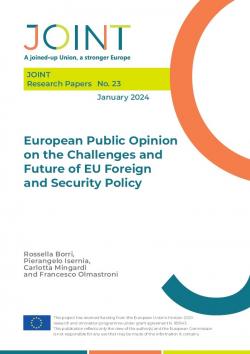European Public Opinion on the Challenges and Future of EU Foreign and Security Policy
The present report illustrates the results of a survey conducted in six European countries (France, Germany, Greece, Italy, Poland and Spain) to assess public sentiments towards EU Foreign and Security Policy (EUFSP). Notably, the survey reveals a strong demand for more EUFSP, with a majority supporting a move away from the unanimity rule toward majority voting. Although there is support for greater defence capacities at the EU level, the majority remains unwilling to relinquish national armies for a unified force. The context of the Russia-Ukraine war introduces potential dissonance: majorities in most countries express readiness to support Ukraine, but differences in support levels and approaches emerge, particularly in Greece and Italy. The survey suggests that while conditions for a more integrated EUFSP exist, political elites need to articulate a persuasive argument for rebalancing the relationship between member states and the EU in foreign and defence matters in favour of the Union. The study acknowledges the possibility of public opinion shifting in the face of politicisation, leaving open questions for future research efforts.
-
Details
Rome, IAI, January 2024, 38 p. -
In:
-
Issue
JOINT Research Paper 23
Introduction: Public opinion and European Foreign and Security Policy
1. Methodology
2. The image of the international system
2.1 International threats
2.2 Relations with China, the US and Russia
2.3 Attitudes toward the international system
Summary
3. The role of the EU as an international actor
Summary
4. The war in Ukraine
Summary
5. European integration: Which directions?
5.1 Selected policy areas
5.2 Institutional structures
Conclusions
References



